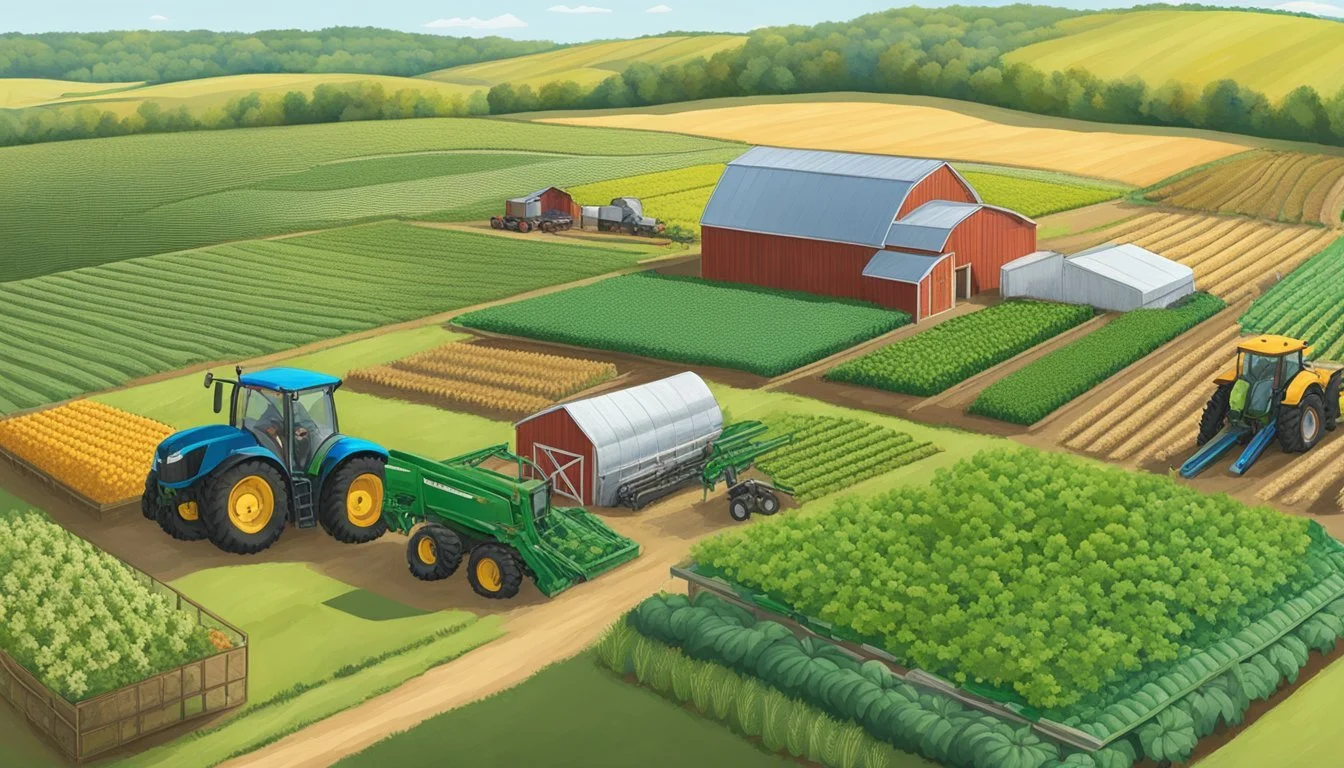Farming Grants Arkansas
Navigating Opportunities for Agricultural Funding
In Arkansas, the agricultural sector plays a pivotal role in the state's economy, contributing significantly to the employment and revenue generation of the region. To support this vital industry, numerous grants and funding opportunities exist, aimed at fostering growth and sustainability for farmers and ranchers. These financial initiatives are designed to meet the diverse needs of the agricultural community, including those involved in commodity production, conservation, and the implementation of more climate-friendly practices.
State departments and federal agencies collaborate to offer these programs, which include initiatives like the Arkansas Grown Grant for Northwest Arkansas Farmers pilot program that targets local farmers in specific counties. Further support comes from the United States Department of Agriculture (USDA) with a range of options from commodity-specific programs to broader efforts focused on soil and water conservation. These grants are essential in assisting ranchers and farmers in Arkansas to not only continue their operations but also to innovate and adapt to changing market and environmental conditions.
Overview of Farming Grants in Arkansas
Arkansas offers a suite of farming grants to support its agricultural sector. These grants aim to enhance the state's agriculture by providing financial assistance through various programs, ensuring farmers are equipped to meet both local and broader scale demands.
Arkansas Department of Agriculture
The Arkansas Department of Agriculture provides grants designed for local farmers, particularly in Northwest Arkansas. A notable initiative includes the Arkansas Grown Grant, aimed at farmers in counties such as Benton, Washington, Madison, and Carroll. This program evidences the state’s commitment to developing the local agricultural economy since 2020.
USDA Assistance Programs
The U.S. Department of Agriculture (USDA) supports Arkansas farmers through multiple assistance programs. Programs such as the Conservation Reserve Program (CRP), Emergency Conservation Program (ECP), and Grassland Reserve Program (GRP) reflect the USDA's dedication to sustainable farming practices. Additionally, disaster assistance programs and initiatives like the Livestock Forage Program (LFP) and Livestock Indemnity Program (LIP) highlight the support offered during challenging times.
Eligibility Requirements
Eligibility for funding is specific to each grant and program. Typically, factors include the size of the farm, type of farming activity, location within Arkansas, and adherence to the relevant agricultural standards. Grants may be specifically targeted at certain demographics, such as small farms or urban agricultural projects.
Application Process
The application process for these grants is detailed and requires precise documentation. Farmers should prepare to submit information regarding their farming operations, financial needs, and environmental practices. Deadlines and application methods vary by program, with some requiring online submissions, and others accepting paper forms. The Arkansas Department of Agriculture and USDA websites serve as vital resources for application guidelines.
Arkansas’s agricultural grants support a vital state industry, ensuring farmers have access to the resources necessary for innovation, sustainability, and resilience in a competitive market.
Types of Available Grants
In Arkansas, various grants are designed to support the agriculture sector, ranging from direct aid for agricultural producers to initiatives targeting rural communities and conservation efforts.
Agricultural Producer Grants
The Arkansas Department of Agriculture provides funding opportunities for agricultural producers. These include two grant types under the RFSI program: infrastructure grants aimed at enhancing farm facilities and simplified equipment-only grants that assist with the purchase of essential equipment.
Rural Community Grant Program
The Division of Rural Services offers grants to preserve the quality of life in rural Arkansas. They offer Rural Services Block Grants and Community Assistance Grants, which are instrumental for community development and fostering local economies.
Conservation and Environmental Grants
The USDA Farm Service Agency lists multiple conservation-focused grants such as the Conservation Reserve Program (CRP) and the Grassland Reserve Program (GRP). These grants support practices that conserve natural resources and promote environmental sustainability.
Forestry and Agroforestry Grants
In the realm of forestry and agroforestry, Arkansas promotes sustainable practices through multiple funding avenues. The goal of these grants is to maintain forest health and support the integration of forestry into agricultural practices, for the dual benefit of income diversification and ecological conservation.
Grant Application Strategies
Applying for grants in Arkansas requires a strategic approach to enhance the chances of securing funding. This includes crafting a compelling application, understanding how proposals are evaluated, and finding additional funding sources or partnerships to strengthen the application.
Writing a Successful Application
Applicants should convey a clear need for their farming project, detailing how the grant will serve their objectives. A successful application should include:
Project Description: Clearly define the project, its goals, and how it will address specific needs within the farming community.
Budget Justification: Itemize expenses that the grant will cover, emphasizing necessities like equipment, training, maintenance, or operations.
Benefit to the Community: Explain how the grant will not only benefit their farm but also contribute to the local economy or community well-being.
Understanding the Scoring Criteria
Grants are often awarded based on a scoring system that evaluates:
Relevance: How well the project aligns with the grant's purpose.
Impact: The potential for significant outcomes or improvements.
Capability: Demonstrated ability to carry out the project successfully.
Applicants should review past recipients to understand what made their applications successful and tailor their submissions accordingly.
Finding Matching Funds and Partnerships
Many grants require matching funds, indicating the applicant's investment in the project. Ways to secure these funds include:
Loans or Cash: Present evidence of loans or available cash that can be allocated as matching funds.
Partnerships: Engage with local businesses or non-profits that can provide financial or in-kind support.
A solid financial strategy can enhance the application's credibility and show commitment to the project's sustainability.
Resource Allocation
Arkansas's agricultural grants serve as vital resources for farm development, targeting assistance for equipment acquisition, workforce skills enhancement, and agriculture output improvement.
Equipment and Property Investments
Through the Arkansas Department of Agriculture, grants of up to $15,000 are allocated to qualifying farmers for equipment and property expenses. These financial aids assist in covering costs that enhance farm functionality and safety.
Key Property Investments: Land conservation, irrigation systems, and building upgrades.
Essential Equipment: Tractors, harvesters, and modern farming technologies ensuring safe food production.
Labor and Workforce Development
The grants are structured to enable farmers to invest in their workforce by providing funding for training programs. This aims to elevate labor skills and retain adept workers within the agricultural sector.
Workforce Training: Educational programs that advance workers' abilities in crop management and equipment operation.
Labor Efficiency: Initiatives to improve worker safety and productivity on farms.
Crop and Livestock Enhancement
Investments transcend beyond the tangible assets; they also focus on enriching the quality of crops and livestock. Funds are dedicated to bolstering farmers’ capabilities to produce healthier food and fiber, through the adoption of sustainable practices.
Crop Enhancement: Supporting diversity in crop production and implementing innovative cultivation methods.
Livestock Care: Finance for improved animal husbandry practices.
Agricultural Policies and Market Trends
In Arkansas, the interplay between agricultural policies and market trends is particularly noteworthy as it drives the state's industry which is integral to both the local and global economy.
Local to Global Market Dynamics
The agricultural sector in Arkansas operates within a complex network extending from local to international markets. The state's policies are designed to bolster individual farmers while also ensuring their competitiveness on a national and global scale. The Arkansas Grown Grant was created specifically to support Northwest Arkansas farmers, demonstrating a commitment to strengthening local markets which, in turn, impacts national markets.
Food System Resilience Policies
Policies aiming at food system resilience are crucial for maintaining fair markets and supply chain stability. For example, Arkansas’s participation in federal programs, such as the Local Agriculture Market Program (LAMP), underscores the state's pursuit of improved market conditions that benefit both producers and consumers. These kinds of policies are essential for fostering a robust food system that can withstand various economic pressures and contribute to fairer markets.
Innovation in Agricultural Practices
Advancements in agricultural practices are often a direct result of funding and grants, which promote innovation. In Arkansas, programs like the Specialty Crop Block Grant allocated $302,776 to fund eight projects focused on specialty crops, indicative of the state's commitment to investing in new agricultural methods and technologies. This kind of support propels the agricultural sector forward, promoting sustainability and efficiency, and impacting both national and international agricultural markets.
Specific Regional Programs
In Arkansas, tailored grant programs provide targeted support for agricultural development in different regions, ensuring that the needs of local farmers are met with precision.
Northwest Arkansas Initiatives
Northwest Arkansas benefits from the Arkansas Grown Grant, specifically designed for farmers in this region. It aids those residing and farming within the key counties of Benton, Washington, Madison, and Carroll. This pilot program focuses on enhancing the agricultural capabilities of local producers through strategic investments.
County-Specific Offerings in Benton, Madison, and Carroll Counties
For farmers specifically in Benton, Madison, and Carroll counties, the availability and application details for grants vary based on the county's agricultural focus and needs. Local USDA Service Centers are a primary point of contact for farmers seeking to apply for relevant opportunities, with specialized conservation programs and funding options tailored to small farms and urban agriculture within these counties. Deadline for application submissions, such as those for the Natural Resources Conservation Service (NRCS) conservation programs, are critical to be noted by interested farmers.
Support for Niche Agriculture
To invigorate Arkansas's farming community, specific grants target niche sectors within agriculture. These grants aim to enhance growth in horticulture, organic practices, and value-added products, reflecting a dedicated support system for specialized farming operations.
Horticulture and Specialty Crops
Arkansas's commitment to horticulture and specialty crops is evident through funding opportunities aimed at an array of fruits, vegetables, and tree nuts (how long do nuts last?). These funds support the costs associated with cultivating high-value crops that are essential for the local food systems.
Assistance Types: Technical aid, cost-share programs, marketing support.
Eligible Participants: Small-scale farmers, local producers focusing on specialized crop varieties.
Impact Goals: Increase local crop diversity, promote sustainable land use, facilitate market growth for Arkansas-grown produce.
Organic and Sustainable Agriculture
Organic and sustainable agricultural practices receive attention through programs encouraging environmentally friendly and health-conscious farming. The integration of organic farming methods aligns with a broader emphasis on sustainable agriculture, influencing a positive transition towards organic certification and conservation practices.
Objectives:
Support transition to organic certification.
Encourage soil and water conservation measures.
Resources Offered: Research grants, educational workshops on sustainable techniques, conservation program funding.
Value-Added Agricultural Products
Grants allocated for value-added agricultural products bolster economic opportunities for Arkansas farmers. By transforming raw produce into market-ready goods, producers can command a higher price point, contributing to the vitality of rural economies.
Criteria for Funding:
Projects must add economic value to Arkansas agricultural products.
Initiatives should enhance product appeal or improve food processing capabilities.
Value Addition Examples:
Packaging raw fruits into consumer-friendly portions.
Processing tree nuts into oils or flours.
Funding Cycles and Deadlines
In Arkansas, farming grants have specific application periods and deadlines that farmers must adhere to for successful submissions. These timeframes are crucial for applicants to plan and prepare their grant proposals.
Arkansas Grown Grant Timelines
The Arkansas Grown Grant, specifically catering to Northwest Arkansas farmers, operates on announced funding rounds. Farmers residing and farming in Benton, Washington, Madison, and Carroll counties can look out for the second round of funding, with deadlines communicated through the Arkansas Department of Agriculture.
Cycle I and II Deadline Overview
The Arkansas Rural Community Grant Program splits its deadlines into two cycles each fiscal year.
Cycle I
Deadline: August 10, 2023
Cycle II
Deadline: March 14, 2024
For those looking to apply, it is critical that they prepare ahead of these dates to ensure eligibility for consideration within the respective cycle.
Innovation and Sustainability Initiatives
In Arkansas, initiatives focused on innovation and sustainability in agriculture are receiving substantial support through various grants. These efforts prioritize resilient local food systems and environmental stewardship, with a commitment to clean energy integration.
Resilient Local Food Production Systems
The Arkansas Department of Agriculture's pilot program, the Arkansas Grown Grant, is a testament to their dedication to reinforcing local food economies. Specifically targeting Northwest Arkansas farmers in Benton, Washington, Madison, and Carroll counties, this initiative ensures that local food production is both resilient and bolstered by sustainable practices. The Biden-Harris administration’s focus on resilient local and regional food production is underscored by the allocation of these targeted funds.
Key Grantees:
Benton County Farmers
Washington County Farmers
Madison County Farmers
Carroll County Farmers
Clean Energy and Environmental Stewardship
Sustainable Agriculture, Research and Education (SARE) has played a pivotal role, extending 87 grants within Arkansas to spur sustainable agriculture innovations. These grants serve as a catalyst for projects that incorporate clean energy solutions into agricultural practices, demonstrating a strong commitment to environmental stewardship.
The U.S. Department of Agriculture (USDA) has further underscored this commitment through expanded opportunities for climate-smart agriculture. One notable program is the Environmental Quality Incentives Program (EQIP) which, in 2023, includes Conservation Incentive Contracts option and is specifically focused on climate-smart practices.
Noteworthy Initiatives:
SARE Grant Awardees
EQIP Climate-Smart Agriculture Practices
Enhancing Equity in Agriculture
Efforts to foster equity in the agricultural sector focus on providing targeted support to underrepresented farmers and addressing the disparities in rural America. These initiatives strive for fairer markets and equitable access to resources for all farmers.
Grants Focused on Underrepresented Farmers
Grants in Arkansas are actively addressing equity by offering financial assistance specifically to underrepresented groups in farming. The Arkansas Department of Agriculture has allocated grants up to a maximum of $15,000 to support farmers with eligible expenses. This financial aid endeavors to level the playing field, by ensuring that minority and small-scale farmers have the same opportunities to succeed as their more established counterparts.
Eligible Expenses:
Equipment purchases
Infrastructure improvements
Training and development
Programs Promoting Rural Equity
Programs such as the Environmental Quality Incentives Program's (EQIP) Small Farm and Urban Agriculture Initiative seek to promote equity in rural regions. Initiatives by the USDA Natural Resources Conservation Service in Arkansas encourage applications from a diverse range of agricultural producers. This includes special emphasis on initiatives that support farming practices beneficial to both the environment and the economic sustainability of small, rural properties.
Key Programs include:
Conservation Stewardship Program (CSP)
Environmental Quality Incentives Program (EQIP)
In summary, Arkansas's approach to agriculture equity combines dedicated grants for underrepresented farmers and comprehensive programs to support long-term sustainability in rural America. Through these measures, Arkansas is striving to create fairer markets that benefit an inclusive array of farmers and producers.
Economic Development Opportunities
Arkansas's farming grants provide a variety of paths for economic development, supporting the expansion of local markets, fostering commercial partnerships, and promoting agricultural tourism to facilitate revenue growth.
Local Market Expansion
Farmers in Arkansas can leverage Rural Service Grants to extend their reach within local food markets. These grants aim to enhance the local economy by increasing the availability of locally grown produce. By doing so, they help farmers to not only support but also to capitalize on the community's demand for fresh, local food.
Partnerships with Commercial Buyers and Distributors
The state offers targeted grant programs that assist in establishing relationships between farmers and commercial buyers or distributors. These connections can pave the way for Arkansas-grown products to enter national and international markets. By providing up to $15,000 for eligible expenses, these programs encourage farmers to scale their operations to meet the volume demanded by larger commercial entities.
Revenue Growth through Agricultural Tourism
Grants in Arkansas also focus on agricultural tourism as a viable means for farming revenue diversification. Initiatives include creating experiences around farm visits, local food festivals, and markets, thus drawing tourists and enhancing farm revenues. This strategic approach not only boosts the state's tourism sector but also reinforces the cultural importance of agriculture in Arkansas.
Educational and Technical Resources
In Arkansas, farmers looking to improve their agricultural practices and business acumen have access to a multitude of educational and technical resources. These include specific programs and centers dedicated to providing the necessary tools and knowledge for advancing agricultural endeavors.
Arkansas Small Business & Technology Development Center
The Arkansas Small Business & Technology Development Center (ASBTDC), based in Fayetteville, offers targeted aid to farmers through grants and educational resources. They provide assistance for free, helping farmers navigate grant applications and optimize their operations for success. The ASBTDC is a critical resource committed to fostering economic development within the agricultural sector of Arkansas.
Extension Service Workshops and Training Programs
Extension Service Workshops and Training Programs are vital resources that deliver hands-on education and training to Arkansas farmers. These programs cover a diverse set of topics including sustainable agriculture, crop management, and modern farming techniques. Through workshops, seminars, and field days, farmers receive the support they need to implement best practices and remain competitive in the market.
Updates and News
In recent developments, both the USDA and the Arkansas Department of Agriculture have made new funding opportunities available to support farmers in Arkansas, marking key efforts in agricultural sustainability and disaster recovery.
Announcements from USDA and the Arkansas Department of Agriculture
The Arkansas Department of Agriculture has rolled out a new pilot program, targeting farmers in Northwest Arkansas, specifically in Benton, Washington, Madison, and Carroll counties. This funding aims to enhance the state's agricultural infrastructure and directly benefit local farming initiatives.
On a national level, the US Department of Agriculture (USDA) has been proactive in Arkansas. Wes Ward, representing the USDA's initiatives, has highlighted multiple sign-ups through conservation-centric programs such as the Environmental Quality Incentives Program for Small Farm and Urban Agriculture, as well as the Conservation Stewardship Program. This reflects the USDA's commitment to supporting the agricultural sector's ecological practices and financial health.
Local Agricultural News And Events
Arkansas farmers and producers are set to receive significant support courtesy of fresh emergency relief payments issued by the USDA. These payments, amounting to over $1.75 billion, are part of a disaster recovery effort that helps farmers and ranchers rebound from natural calamities that occurred in previous years.
In other news, Arkansas producers have already benefited from a considerable funding injection of $112.5 million under the USDA's Emergency Relief Program. The initiative addressed losses due to natural disasters in 2020 and 2021, illustrating the federal commitment to sustaining the livelihoods of those in the agricultural community.
Success Stories and Performance Tracking
The efficacy of farming grants in Arkansas is underscored by the achievements of grant recipients and the ongoing evaluation of project outcomes. Accurate performance metrics provide a picture of the dedication behind these initiatives and celebrate the success stories arising from them.
Grant Recipients and Project Outcomes
List of Recent Grant Recipients and Their Projects:
Northwest Arkansas Farmers: Beneficiaries of the Arkansas Grown Grant utilized funds for operational improvements, directly impacting agricultural productivity within Benton, Washington, Madison, and Carroll counties.
Rural Service Award Winners: These entities invested in community infrastructure, demonstrating the transformative potential of rural grants on local economies.
Each recipient demonstrates dedicated project execution with tangible outcomes that are a testament to the success of grant funding. These impacts are often reported through state agriculture department communications.
Impact Measurement and Metrics
Key Performance Indicators:
Economic Improvement: Revenue increase for grant-recipient farms.
Job Creation: Number of new jobs generated due to grant funding.
Operational Efficiency: Reduction in costs or increase in production yield.
Performance metrics are essential for assessing the success of grant-awarded projects. Tracking these indicators offers a transparent evaluation of how well the grants serve their purpose and contributes to the economy of Arkansas. They are critical in ensuring funds are directed towards efforts that yield positive results.












